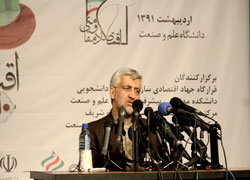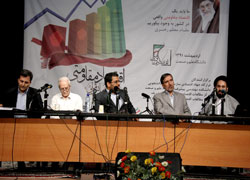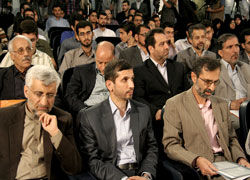
Dr. Jalili in the first conference on a resistant economy: That which will Come to an End is Pressure Placed on the Iranian People The first conference about a resistant economy took place on Thursday, the 17th of May 2012 with the presence of Iranian officials and representatives, in Iran University of Science and Technology’s Shahid Bahrami conference room. Dr. Jalili, Secretary of Supreme National Security Council of Iran , commented about the sanctions placed against Iran throughout the past thirty years, and added, “Those who feel they can pressure the Iranian people through sanctions, are playing in our field; because this act allows for an enhanced Islamic Republic." Dr. Jalili discussed talks about “negotiations coming to an end” and added, “That which is coming to an end is pressure placed on the Iranian people, for without doubt, difficulties result in further resistance and growth.” In response to why the many pressures on the Islamic Republic, Dr. Jalili explained, “The Islamic Republic was born in an era where a variety of international occurrences were taking place, including wealth and power monopolies.” “There were those who succeeded to rule with the aids of different military, political, economic, and cultural tactics;” he explained, “Rulers felt threatened in the opening days of the Islamic Republic because a new thought had been born, suggesting that these monopolies must be broken. They feared that these new thoughts would create change within the systems, and therefore strived to prevent such thoughts from prospering.” Later Dr. Mahdi Ghazanfari, Minister of Industry, Mine and Trade, expressed that according to the World Bank and International Treasury reports, the Islamic Republic of Iran stands 2nd place in the Middle East and North Africa for its gross domestic production, and stands 17th place from among 183 countries. He added, “In the upcoming talks of 5+1, Iran will be participating with an economy that won 17th place. Iran is a country with great mineral diversity,standing in 10th place for this matter. Even if other countries refuse to buy Iran’s oil, it has many other minerals to offer." Dr. Ghazanfari reported, “According to a report by Anecdote and the World Trade Organization, Iran stands among the ten best countries for its’ cement production. Iran also holds the largest lead factory in the Middle East, and stands in 17th place for its' steel production.” “Iran stands among the first ten countries in its production of copper, and fifth place in its ceramic and tile production. It holds first place in its Firozeh stone, pistachio, and saffron production. And it stands in 40th place for its knowledge based companies,” he explained. Dr. Ghazanfari further noted, “Iran’s economy is an economy filled with God-given treasures, and its’ vulnerability is at its lowest.” Later Dr. Jabal Amoli, IUST’s chancellor, suggested that it is critical to devise a proper structure and paradigm for national and international occasions and economic relations.” Although two approaches have constantly been under review,” he added, “we have focused mainly on the first approach, implementing Western thought in all areas, while only giving it a vague Islamic appeal.” He referred to Islamic Banking as an example, “Our banks work on interest, but instead of changing the system as a whole, the system itself was redefined in a more complicated manner.” Dr. Jabal Amoli identifies the establishment of structures based on Islamic thought as the second and more crucial step towards an Islamic government. “Although,” he added, “this does not mean to ignore other economic structures in the process.” Dr. Alireza Moeini, Dean of Progress engineering at IUST, spoke at this conference noting that colonists from different countries have plundered Iran’s oil for ten decades. He added that “among the most successful secrets of Iran’s economy has been supporting the workforce and asset productions.” Another important figure present at this conference, Dr. Derakhshan, faculty at Allameh Tabatabaei University, emphasized that the advertisement of foreign products goes against a resistant economy. The conference continued until Thursday afternoon with Dr. Mohsen Rezaee, Secretary of the Expediency Council, who emphasized that this resistant economy, is in fact, a resistance to force, "The West has shown resistance to Iran’s success for more than a decade. While they speak of a free Iran on the surface, they act otherwise." Dr. Rezaee reminded the audience of the many difficult periods Iran went through, Iran’s freedom from Reza Khan, Iran's independence for its oil, and its periods of war. The difference in this new threat, he added, "lies in national security; the United States has threatened us further than oil and the world bank." When asked if the problem leads back to Iran's uranium enrichment, Dr. Rezaee explained, "Their concern lies in preventing Iran from moving forward. We put our hope in the United Nations, believed in ourselves, made risks, and started making changes." 
This conference ended with the following final remarks: In the Name of the Most High Iran's Supreme Leader, Ayatollah Khamenei said, "We must show the world the Islamic Republic's power in the area of solving our financial problems; let us be an example for other nations to show how a nation represented by Islam can succeed." A thorough analysis of the Supreme Leader's comments throughout the recent years,bring us to the following concepts: we must be an Islamic example for other nations; prove that an Islamic country is capable of solving its financial matters; overcome outside threats. The Islamic Republic has constantly been under the scrutiny of Western countries, especially America. They have placed us under political, cultural, and economical pressures. Their efforts are to make it difficult for other countries to have financial relationships with Iran, and create problems in Iran's global trade. They seek to reduce our country's revenue, and prevent us from receiving the aid we used to receive from outside. These sanctions are difficult in the sense that it forces a country to surrender. Some leaders deem the sanctions temporary, and seek short term solutions to overcome this period. But the issue with the Islamic Republic stretches far back in time. They will not stop until they surrender our nation. They work with short term plans, incorporate briberies, create further corruption in our country, and result in our people's dissatisfaction. On the other hand, there are those in charge who suggest western solutions to create a connection with Western nations, and remain in debt to them. This also will not solve our dilemmas. The Islamic Republic must devise a plan that goes in accordance with its own belief systems such as: · Allow all people active roles in the nation's economy, so that it is not limited to a few. · Devisea plan for war situations and sanctions. · Enable the system with abilities that can confront other nations. · Guarantee our nation's success and equality in society. · Guarantee our nation's success in all areas. · Protect the national treasury and our nature given gifts. Movement towards achieving these goals should begin well before, and it is expected of the university community to strive towards attaining such examples; an example in which the Supreme Leader has referred to as "a resistant economy". One of the main factors of this resistant economy is protecting national production. With the goal to increase competition and production of our products, we can increase our nation's accomplishments. Protecting national production has two aspects: 1. Products that have to do with our country's essential needs, such as food, medicine, and energy products 2. High tech products Our intellectuals believe that the main methods to make up for our country's losses are job creation, wealth and product creation. It is up to our front-runners in government to initiate necessary grounds for supporting our national productions. In the end, it is noteworthy that sanctions will not prevent our country's growth, rather as proven before, it creates strength and abilities for the better improvement of our system. As the Supreme Leader has urged, it is necessary for all of us to strive for national production and show the world that Iranian people will not lose strength in these areas. 
|